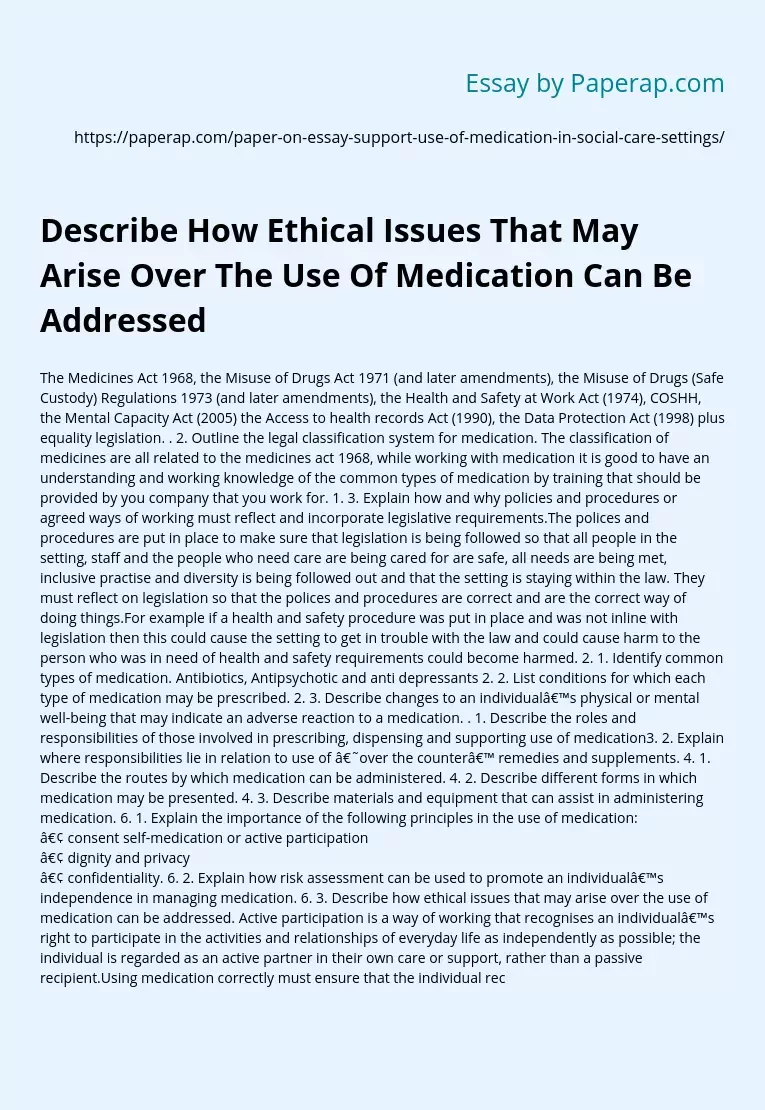Addressing Ethical Issues in Medication Use
The Medicines Act 1968, the Misuse of Drugs Act 1971 (and later amendments), the Misuse of Drugs (Safe Custody) Regulations 1973 (and later amendments), the Health and Safety at Work Act (1974), COSHH, the Mental Capacity Act (2005) the Access to health records Act (1990), the Data Protection Act (1998) plus equality legislation. . 2. Outline the legal classification system for medication. The classification of medicines are all related to the medicines act 1968, while working with medication it is good to have an understanding and working knowledge of the common types of medication by training that should be provided by you company that you work for.
1. 3. Explain how and why policies and procedures or agreed ways of working must reflect and incorporate legislative requirements.The polices and procedures are put in place to make sure that legislation is being followed so that all people in the setting, staff and the people who need care are being cared for are safe, all needs are being met, inclusive practise and diversity is being followed out and that the setting is staying within the law.
They must reflect on legislation so that the polices and procedures are correct and are the correct way of doing things.For example if a health and safety procedure was put in place and was not inline with legislation then this could cause the setting to get in trouble with the law and could cause harm to the person who was in need of health and safety requirements could become harmed. 2. 1. Identify common types of medication. Antibiotics, Antipsychotic and anti depressants 2.
2. List conditions for which each type of medication may be prescribed. 2. 3. Describe changes to an individual’s physical or mental well-being that may indicate an adverse reaction to a medication. . 1. Describe the roles and responsibilities of those involved in prescribing, dispensing and supporting use of medication3. 2. Explain where responsibilities lie in relation to use of ‘over the counter’ remedies and supplements. 4. 1. Describe the routes by which medication can be administered. 4. 2. Describe different forms in which medication may be presented. 4. 3. Describe materials and equipment that can assist in administering medication. 6. 1. Explain the importance of the following principles in the use of medication:
• consent self-medication or active participation
• dignity and privacy
• confidentiality. 6. 2. Explain how risk assessment can be used to promote an individual’s independence in managing medication. 6. 3. Describe how ethical issues that may arise over the use of medication can be addressed. Active participation is a way of working that recognises an individual’s right to participate in the activities and relationships of everyday life as independently as possible; the individual is regarded as an active partner in their own care or support, rather than a passive recipient.Using medication correctly must ensure that the individual receives:
• the correct medication
• in the correct dose
• by the correct route
• at the correct time
• with agreed support
• with respect for dignity and privacy. Practical difficulties may include:
• lost medication
• missed medication
• spilt medication
• an individual’s decision not to take medication
• difficulty in taking medication in its prescribed form
• wrong medication used
• vomiting after taking medication
• adverse reaction
• discrepancies in records or directions for use.
Essay Example on Support Use Of Medication In Social Care Settings
Addressing Ethical Issues in Medication Use. (2019, Nov 27). Retrieved from https://paperap.com/paper-on-essay-support-use-of-medication-in-social-care-settings/

